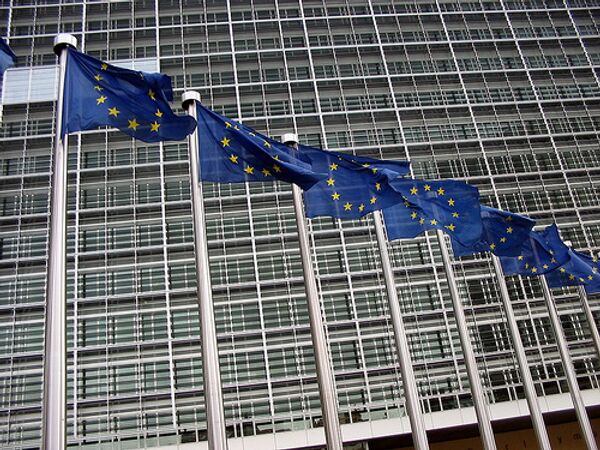MOSCOW, May 29 (RIA Novosti), Daria Chernyshova – Opinions regarding the Eurasian Economic Union’s tight cooperation with the EU differ, with many saying it is likely and others claiming the opposite.
“The project of Eurasian integration was created on the basis of two matrixes – one is the WTO principles, another is the experience of the European Union in order to get in close cooperation with Europe. Unfortunately, the political events of 2008 and 2014 delay this prospect,” said Andrey Suzdaltsev, Deputy Dean of the School of the World Economy and International Affairs at the Higher School of Economics. “The EU cannot see the Eurasian Economic Union as a real partner. They say Russia is dominating it, they all try to bargain the benefits and thus work on a county-to-country basis.”
Renaissance Capital’s Russia and CIS economist Oleg Kouzmin, however, stressed that the Union would “definitely cooperate with both – the Eurozone and Asian countries.”
On Thursday, the leaders of Russia, Belarus and Kazakhstan signed the Eurasian Economic Union Treaty that will enter into force January 1, 2015. The treaty will bring the three countries to a higher level of integration, including commitments to guarantee the free movement of goods, services, capital and labor as well as the implementation of coordinated policies in key sectors such as energy, industry, agriculture and transport.
Commenting on the Union’s cooperation with Europe, President Vladimir Putin said that the EU was unwilling to deal with the Customs Union as a whole.
“Until recently, our colleagues refused to deal with the Customs Union, arguing that the EU is ready to cooperate with each individual member state but not with their association,” Putin said last week at the St. Petersburg International Economic Forum. “This is strange logic, because we are willing to work, and we are working with individual EU countries and with the EU as an association.”
“EU will prefer single states as partners because their position towards the EU will be in concrete cases a weaker one,” said Richard Stojar, a professor at the University of Defense in Brno.
“Similarly as the Russian Federation prefers in many issues bilateral cooperation with single EU member states and the EU tries currently to achieve common approach under the framework of energy policy or better to say the one common EU approach in the energy trade with the Russian Federation,” he told RIA Novosti.
As for the Asian markets, opinions also differ. Some believe in the short term the union will not bring Russia closer to Asia. “This would not help Russia to work closer with Asian markets immediately, however, this might be the case in the longer perspective – when other Asian countries would probably start joining the Union (with Kirgizia probably on the way),” Kouzmin told RIA Novosti.
However, Suzdaltsev said the entry to the Asian markets “is a common policy of all member-states, and they have a unified approach in going to the markets of China, Vietnam, India.” He stressed that India has expressed interest in cooperating with the Union. “So the project has good prospects.”
Overall, the experts stress that signing of Eurasian Economic Union Treaty is beneficial for all the member-states.
“The signing of the EEUT [Eurasian Economic Union Treaty] is an important step on a way to further integration between the member countries. We expect we would not see immediate boost in the short-term due to signing this agreement (as, for instance, from the gas deal with China), but we believe this would bring longer-term gains,” Kouzmin said, adding that the gains would come from greater cooperation between the country members which would help to increase the efficiency of resources re-allocation.
“The main positive impact, probably, would be more noticeable for Belarus and Kazakhstan, though Russia would also be a beneficiary. This a game where all are winners,” Oleg Kouzmin said.
Richard Stojar added that “deeper cooperation and reduction of mutual barriers” will be beneficial for the economies of member-states.




